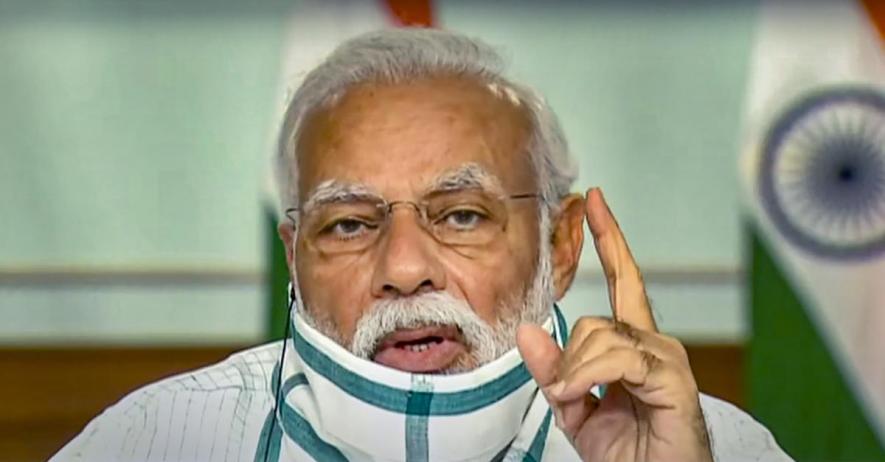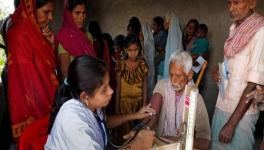Modi’s Stimulus Package for Health Has No Stimulus, Says JSA

Image Courtesy: PTI
The stimulus package for helath declared by Prime Minister Narendra Modi under the Aatma Nirbhar Bharat Abhiyan does not have any stimulus, said Jan Swasthya Abhiyan (JSA)—a platform of networks and organisations fighting for people’s right to health and universal access to healthcare—has said in a statement. It said the relief package is full of ‘empty promises, accounting juggleries and a series of concessions to big business, while rights of workers are being withdrawn’.
The statement pointed out that in comparison to the concessions announced for the business community, the meagre cash transfers announced in late March 2020 as part of the Pradhan Mantri Garib Kalyan Yojana stand nowhere, since most of those were ‘recycled versions of existing measures”. “They have offered little relief to the suffering masses, which is incomprehensible when the country is facing a large scale humanitarian crisis where millions of migrant daily wage workers have lost their livelihoods, have been forced to reverse migrate to villages on foot with no means to feed their families, and there have been hundreds of casualties as a result,” it said, and added that in the wake of such widespread destitution and hardship faced by millions of people across the country, it was expected that the union government would make budgetary commitments. “Among the many important elements missing in the package is any concrete commitment to strengthen the public health system,” it added.
FAILURE OF PMJAY
JSA mentioned in their statement that despite the hype created by the Pradhan Mantri Jan Arogya Yojana (PMJAY), the private sector has completely failed to respond to the crisis in the wake of the COVID-19 pandemic. The private corporate sector was very vocal in demanding that COVID-19 treatment be made part of the PMJAY package in the initial days of the pandemic. The National Health Authority and the NITI Aayog promptly responded including COVID-19 reimbursements in their packages. The statement adds, “But the Covid experience clearly suggests that neither the private sector is capable, nor is it interested in helping out in this public health crisis; a testimony to this is their demand for maintaining high pricing for tests (Rs. 4,500), whereas the cost of testing in public facilities is much lower. There were a number of cases of denial of care after which some state governments entered into agreement with private sector hospitals and also requisitioned their services.”
LOW PUBLIC SPENDING ON HEALTH
As the statement pointed out, public investment on health in India is among the lowest in the world. In terms of government resources invested in healthcare, India’s spending is among the least (0.9% of the GDP) across countries, while emerging economies such as China, Brazil and South Africa spend more than 3% on health. India’s neighbouring countries, which have done reasonably well in providing universal access to health for its citizens, such as Thailand (2.8%), Malaysia (2%), Sri Lanka (1.6%), invest much more on health.
Also read: Why Pandemic Crisis Shows no Will to Push Public Healthcare in India
In the last Budget presented in February, about a month-and-a-half before the lockdown due to pandemic, there was a 4.3% decline in real terms in allocations for the health sector. Union government’s allocation on health came down to 0.24% of GDP in the year 2015-16 and has recovered only marginally since then. The Health and Wellness Centres (HWCs), a key component under Ayushman Bharat, meant to make primary care more comprehensive, also did not receive any significant allocations. The statement said, “These systemic challenges have shown up the grossly inadequate response of the government health system to the COVID-19 challenge, demonstrating their total the lack of preparedness."
NEED FOR A STRONGER PUBLIC HEALTH SYSTEM
According to JSA, a stronger public health system could prevent many COVID-19 deaths. It pointed out that the wide variations in public expenditure on health across the states in India has clearly affected the response of the states to the ongoing crisis. As per 2016-17 NHA report, Government Expenditure on health (GHE) in Kerala stood at Rs 2,149 per capita, more than four times higher compared to what is spent in Bihar (Rs 504 per capita), and thrice as much as UP spends (Rs 772 per capita).
The statement said, “This disparity in spending also gets reflected in the varying density of government infrastructure for health care and shortage of human resources in States. States such as Kerala and Tamil Nadu have not only created more health care institutions, but have also invested substantially in strengthening primary care, preventive and public health services over a long period of time. Failure of resource rich states such as Maharashtra and Gujarat in dealing with the pandemic has exposed weaknesses of public health and primary care in urban areas in these States (these States also have low per capita expenditure as % GHE – Rs. 1,216 and Rs. 1,429 respectively).”
Get the latest reports & analysis with people's perspective on Protests, movements & deep analytical videos, discussions of the current affairs in your Telegram app. Subscribe to NewsClick's Telegram channel & get Real-Time updates on stories, as they get published on our website.
























